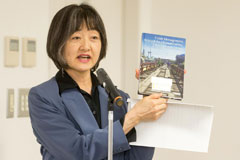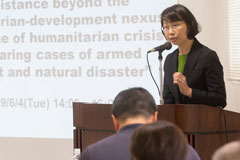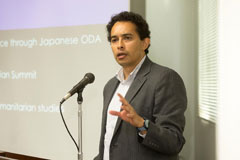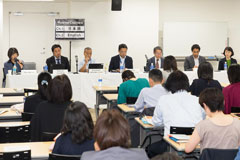Discussing Assistance Beyond the Humanitarian-Development Nexus in Humanitarian Crises
2019.07.12
On June 4, 2019, the symposium "Assistance beyond the humanitarian-development nexus at the time of humanitarian crisis: Comparing cases of armed conflict and natural disaster" was held at the JICA Research Institute (JICA-RI).
At the symposium, six panelists discussed the link between humanitarian aid and developmental aid in the context of the book “Crisis Management Beyond the Humanitarian-Development Nexus” (published in October 2018), a compilation of the results of the JICA-RI's research project "Comparative Study of Humanitarian Crisis Management from the Perspective of Bilateral Cooperation Agencies." The panel included some of the authors of the book.
In her opening remarks, JICA-RI Senior Research Fellow Ako Muto said, "In recent years, natural disasters, armed conflicts and a variety of other humanitarian crises have caused large-scale damage around the world." She emphasized the need for a "continuum" from emergency humanitarian assistance to rehabilitation and development in order to address such crises.

JICA-RI Senior Research Fellow Ako Muto gave opening remarks
Yukie Osa, professor at Rikkyo University and president of the NPO Association for Aid and Relief, Japan, and one of the authors of the book, gave the keynote speech. Osa explained that the search for the "continuum" has continued for almost 30 years, since the adoption of the United Nations General Assembly Resolution 46/182 of 1991. She said, "Similar to the question of how we should live, this is a fundamental question, and will not be solved overnight." In that context, it is important for donors to propose plans and policies with strong will to resolve this issue. Osa expressed her expectations, saying, "This book is the ultimate attempt to do so, and even if it does not result in a solution, it is the result of facing important universal issues head on."

Yukie Osa, professor at Rikkyo University and president of the NPO Association for Aid and Relief, Japan, gave the keynote speech
Next, Oscar A. Gómez, assistant professor at Ritsumeikan Asia Pacific University, co-editor and author of the book and former JICA-RI research fellow, introduced the overall research. Gómez spoke that the purpose and background of the research project are to understand the actual practice of human security in the field, and to further the discussions on how to fill the gap between humanitarian aid and developmental aid, which former JICA President Sadako Ogata had been working on since she was the United Nations High Commissioner for Refugees.

Oscar A. Gómez, assistant professor at Ritsumeikan Asia Pacific University and former JICA-RI research fellow, introduced the overall research
The project conducted comparative research for about three years, starting in Jan. 2015, on the approaches to six crises by major donors. It took up the East Timor conflict, the South Sudan conflict and the Syrian crisis as armed-conflict case studies and Hurricane Mitch in Honduras, the Indian Ocean earthquake and tsunami in Indonesia and Typhoon Yolanda in the Philippines as disaster case studies. Gómez explained that the results of the project indicated that to connect the different phases from relief to rehabilitation and development, it would be necessary for all actors to 1) collaborate with the recognition that the process of crisis management is non-linear, 2) begin prevention activities from the time the crisis occurs and 3) always put the local actors or the affected area at the center rather than giving primacy to the donor agency’s point of view. In the case of 3) in particular, Gómez called attention to the fact that at time, donors become too fixated on the continuum among themselves, and reiterated that the important thing is to center the affected area.
In the panel discussion, Ryoji Tateyama, professor emeritus at the National Defense Academy of Japan, who was author of the Syrian crisis chapter in the book, explained that because of the influence of political circumstances in armed conflicts, it is difficult to implement aid with neutral and universal standpoint, and there would occur contradictions. Tateyama suggested that it is important first to recognize such issues, and then to address them one by one. In addition, JICA Senior Advisor Mikio Ishiwatari, who wrote the Indian Ocean Earthquake and Tsunami chapter in the book, and Takeshi Komino, secretary general of Church World Service Japan and JICA Senior Advisor Atsutoshi Hirabayashi, who served as commentators, emphasized the significance of taking the perspective of the affected people from their experiences of providing aid for recovery from disasters and from the Great East Japan Earthquake in the context of international cooperation.

The panelists answered questions from the audience
JICA-RI Director Izumi Ohno closed the symposium by mentioning that she had again recognized the difficulty of the "continuum," and that we need to continue conducting research to find out what we can do while learning about the approaches taken by international organizations, NGOs and the private sector, as well.

事業事前評価表(地球規模課題対応国際科学技術協力(SATREPS)).国際協力機構 地球環境部 . 防災第一チーム. 1.案件名.国 名: フィリピン共和国.

事業事前評価表(地球規模課題対応国際科学技術協力(SATREPS)).国際協力機構 地球環境部 . 防災第一チーム. 1.案件名.国 名: フィリピン共和国.

事業事前評価表(地球規模課題対応国際科学技術協力(SATREPS)).国際協力機構 地球環境部 . 防災第一チーム. 1.案件名.国 名: フィリピン共和国.

事業事前評価表(地球規模課題対応国際科学技術協力(SATREPS)).国際協力機構 地球環境部 . 防災第一チーム. 1.案件名.国 名: フィリピン共和国.

事業事前評価表(地球規模課題対応国際科学技術協力(SATREPS)).国際協力機構 地球環境部 . 防災第一チーム. 1.案件名.国 名: フィリピン共和国.
scroll